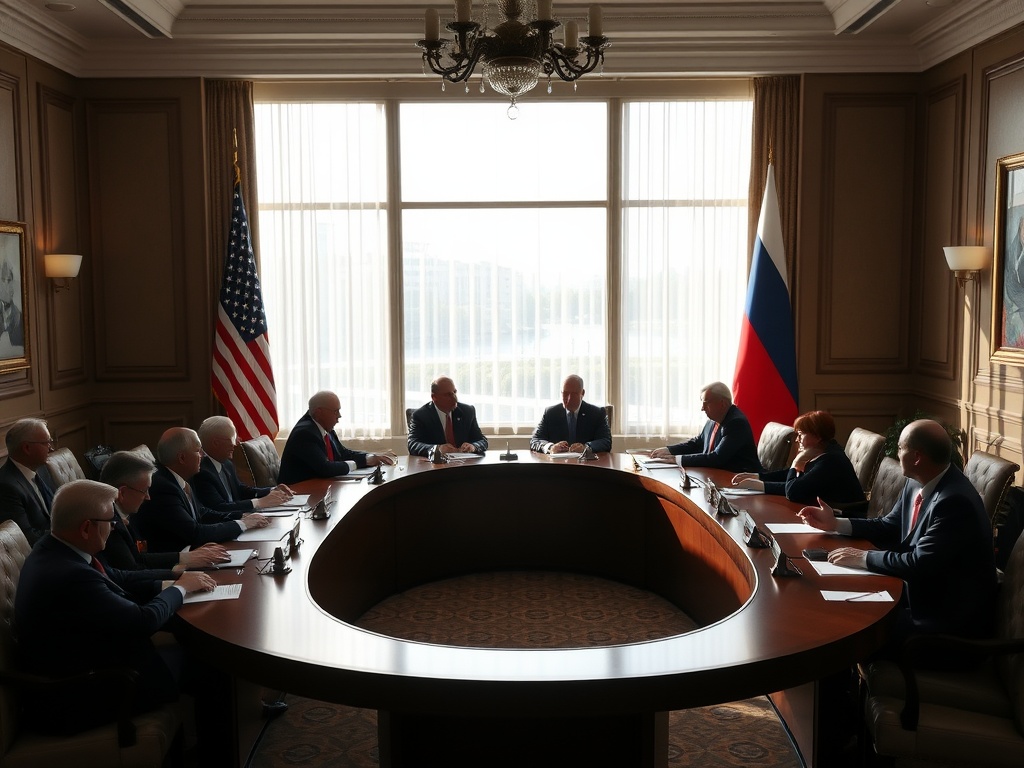US and Kremlin Officials Engage in Peace Talks for Ukraine
As officials from the United States and the Kremlin converge in Saudi Arabia to initiate discussions regarding a potential peace settlement in Ukraine, the Trump administration has sent a flurry of mixed signals about what such a deal might entail. General Keith Kellogg, serving as the White House’s lead envoy on Ukraine, ignited controversy over the weekend by asserting that while European nations would be consulted, they would not be included in the actual negotiations. This stance indicates a clear message from the Trump administration: European NATO countries will bear the primary responsibility for peacekeeping once the conflict concludes.
With the United States seemingly distancing itself from deploying troops to enforce any future peace agreement, reports have surfaced indicating that a coalition of European nations, spearheaded by Britain and France, is quietly devising a plan to dispatch troops to Ukraine following a resolution of hostilities. The i Paper delves into the potential framework of a peace deal and the challenges that lie ahead.
Can the US Collaborate with Russia to Forge a Peace Agreement?

The recent surprise phone conversation between Donald Trump and Vladimir Putin regarding a potential peace settlement has raised eyebrows, particularly after Ukrainian President Volodymyr Zelensky emphatically stated he would “never accept” any outcomes decided by the two leaders without Ukraine’s involvement. Kellogg reassured that Ukraine would be “of course” included in the peace talks, yet it remains uncertain whether Kyiv will have a seat at the negotiating table in Saudi Arabia.
Trump has advocated for Russia’s reintegration into the Group of Seven (G7), seemingly as an effort to normalize relations between Washington and Moscow. Furthermore, US Secretary of State Marco Rubio engaged in discussions with Russian Foreign Minister Sergei Lavrov about dismantling the “unilateral barriers” imposed by Joe Biden’s administration.
While the relationship between the US and Russia appears to be warming, Dr. Stephen Hall, a lecturer in Russian and Post-Soviet Politics at the University of Bath, pointed out that their objectives are “diametrically opposed.” He remarked, “I believe Trump is eager to expedite this process. He has suggested resolving it in a single day.” In contrast, he noted that “Putin will extend negotiations for as long as possible, as he perceives the war as a victory. The Russian economy is entirely geared towards the military campaign at the moment.” Dr. Hall concluded, “Putin has no intention of ending this conflict peacefully; the peace he envisions involves Ukrainian capitulation and potential re-invasion if deemed necessary.”
What About Ukraine’s Rare Earth Minerals?
The United States has sought access to Ukraine’s rare earth minerals, including critical resources like lithium and uranium, as a form of “compensation” for the support provided to the war-torn nation. Trump has endorsed this initiative, claiming that Ukraine “essentially agreed” to transfer its natural resources. “I informed them [Ukraine] that I want the equivalent of $500 billion worth of rare earth minerals,” Trump stated. “And they’ve largely consented to that, so at least we don’t feel foolish. Otherwise, we would be acting foolishly. I insisted that we must acquire something in return; we cannot keep funding this effort without receiving anything.”
However, Zelensky indicated that his ministers rejected this proposal after discussions with US Vice President JD Vance at the Munich Security Conference, as it did not provide adequate security guarantees for Ukraine. “I refrained from allowing the ministers to sign a relevant agreement because I believe it is insufficient to protect our interests,” Zelensky disclosed to The Associated Press in Munich.
Stefan Wolff, a Professor of International Security at the University of Birmingham, suggested that Ukraine might still consider granting US mining companies rights to explore and extract resources from its territory. “You can’t simply hand over $500 billion worth of critical minerals. More likely, Ukraine would offer preferential concessions to US mining companies for exploration and extraction while allowing its domestic companies to continue selling from existing mines (although there isn’t a notable record of Ukraine as a significant exporter). The revenue generated could be channeled towards purchasing arms, munitions, and equipment from the US,” he explained. However, he added, “It remains uncertain how many of these deposits lie within Ukrainian-controlled areas or will remain accessible by the time a ceasefire is established, as well as how much can be mined without compromising Ukraine’s agricultural output.”
What Could Peacekeeping Efforts Entail?
Zelensky has urged his European allies to establish a unified military force during the Munich Security Conference, previously stating that up to “100,000 personnel” would be essential to counter Russian aggression and maintain peace. Meanwhile, US Secretary of Defense Pete Hegseth has dismissed the possibility of American troops being deployed to Ukraine.
Professor Hall indicated that the deployment of American troops would only be considered in the “very unlikely” event that Putin escalates the conflict in a manner that poses a threat to US citizens. “I cannot envision American peacekeepers entering Ukraine unless Putin makes a grave miscalculation resulting in an atrocity that would directly impact Americans. That scenario seems improbable,” he noted.
Meanwhile, a coalition of European nations is reportedly preparing to send troops to the region to ensure stability if a peace agreement is reached. The Associated Press has pointed to Britain and France as the driving forces behind these peacekeeping initiatives. Sir Keir Starmer has previously expressed that the UK would fulfill its “full part” in supporting peace efforts in Ukraine, suggesting the possibility of British forces being deployed if European troops are also sent as part of a ceasefire agreement with Russia. However, Lord Admiral West, the former head of the Royal Navy, cautioned that while British forces would be compelled to participate if European troops are involved, “they’re not formidable enough on their own to effectively counter any Russian threat.”




